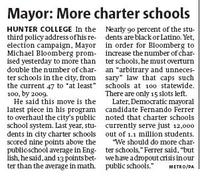So says James Oddo, a Republican Councilmember from Staten Island, explaining his opposition to the Education Equity Act, which would mandate the Dept. of Education and schools to translate for non-English speaking parents. Oddo, and a few other councilmembers that oppose the bill (the NY Sun article below reports that it will almost certainly pass soon), argue that such a bill would take the incentive away from parents to learn English.
I've written about the Education Equity Act a number of times before, but this line of reasoning really makes me mad. I have a number of parents from the after school program that are taking ESL classes at night (after working all day), and I can guarantee that they would still be there even if trying to talk to a teacher or school official about their kid wasn't a nightmare, which it is right now despite Bloomberg's Translation Unit. These parents do want to participate in their child's school, but they also want to help their kids with homework, deal with everyday issues and get better jobs, and this won't change if the Education Equity Act passes.
Council Translation Services Effort Faces Education Dept. Opposition
BY DEBORAH KOLBEN - Staff Reporter of the Sun
December 7, 2005
A $20 million plan to mandate translation services in eight languages for parents of immigrant children in New York City will be opposed by the city's Department of Education if, as expected, it passes the full City Council this month.
The bill approved by the Education Committee and known as the "Education Equity Act," has been welcomed by immigrant groups as a matter of "civil rights." They say parents are being shut out of their children's education because they cannot understand report cards, parent teacher conferences, and other school meetings. Some opponents of the bill have criticized the cost and say that it provides no incentive for parents to learn English.
Now the Department of Education has warned that the City Council could be stepping outside its jurisdiction. Under state law, only the Department of Education or Albany can legislate matters that are "educational or pedagogic," a spokeswoman for the department, Kelly Devers, said.
"While we agree with the goal of effectively communicating to non-English-speaking parents, and believe that the bill is aligned with our recently announced expansion of efforts in this area, we have serious concerns with the practical implications of the bill, including its funding," she said.
Andrew Friedman, the director of a Brooklyn immigrant advocacy group, Make the Road By Walking, argued differently: "These are parents who have a ton of desires to see their children succeed academically; and they really had the schoolhouse door slammed in their face." The law would require translation and interpretation services in the top languages spoken in New York City, including Russian, Haitian Creole, Urdu, Arabic, and Chinese. More than one in three New Yorkers are foreign-born, according to 2000 census data.
Last summer, the city established a new $10 million translation unit for schools to pay for interpreters and translation of some documents. Half of the funding is given directly to schools.
The Education Equity Act would go further in specifying when and for what meetings schools would have to provide interpreters and what materials they would have to translate.
Schools with growing numbers of immigrant families have been struggling to reach out to parents. At P.S. 226 in Bensonhurst, Brooklyn, many parents speak only Russian, Urdu, Hindi, or Chinese. The principal, Stephen Porter, said that this year the school received about $27,000 to provide translation and interpreters. He has often had to rely on students to translate for their parents, but that is less than ideal: "When a child is interpreting; you don't know if
they're telling the truth or if they're bending it to their benefit."
The three council Republicans are leading the charge against the Education Equity Act. Mayor Bloomberg is likely to veto the bill if it passes.
The Republican minority leader, James Oddo, sent out letters yesterday along with seven other council members encouraging their colleagues to vote "no." The letter includes a quotation from a 1999 State of the Union address by President Clinton about the importance of immigrants
learning English.
"We're all the children of immigrants," Mr. Oddo told The New York Sun. "I understand the importance of parental involvement, but not at the expense of the English language."

 P.S. Something else the public should know about charter schools -- a
P.S. Something else the public should know about charter schools -- a